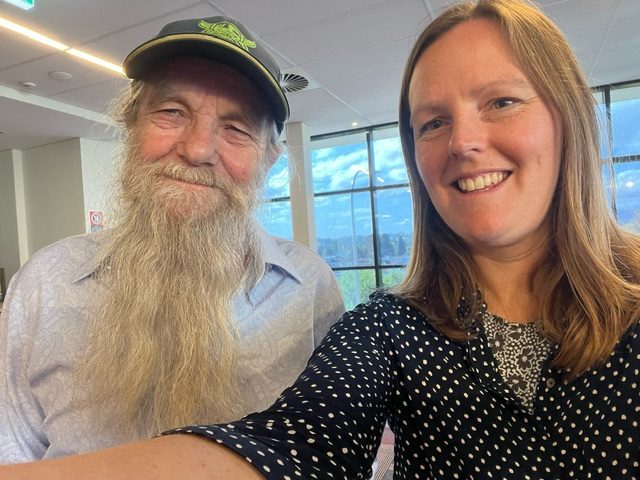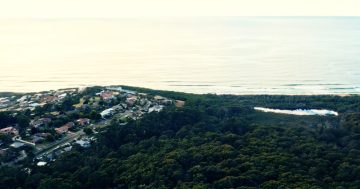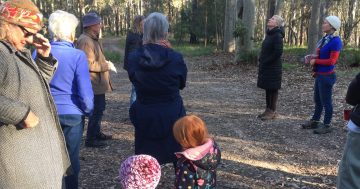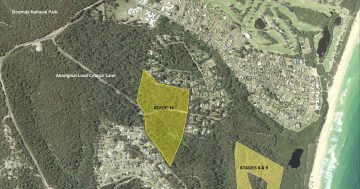
Sally Christiansen, Alex Young, Maryanne Stuart, Judy Hannan, Clayton Barr, Sally Quinnell, Nick Summers, Dr Michael Holland and Sam Tierney at the roundtable discussion about zombie DAs in Bega on 9 September. Photo: Sally Christiansen.
As part of a NSW parliamentary inquiry into historical development consents, four regional MPs met with Far South Coast residents who are fighting against so-called ‘zombie developments’ in their neighbourhoods.
It is early days in the inquiry and residents who attended are not holding their breath for any quick fix. It has not weakened their resolve to oppose inappropriate developments that were approved under legislation that is now outdated.
The private roundtable was held in Bega on Monday (9 September). The MPs attending were inquiry committee chair Clayton Barr (Cessnock), deputy chair Sally Quinnell (Camden), Judy Hannan (Wollondilly) and Maryanne Stuart (Heathcote).
They met with Sally Christiansen, president of Dalmeny Matters, Alex Young, president of Friends of CRUNCH, the group opposed to a development at Tura Beach, Sam Tierney, the lawyer representing CRUNCH, and Nick Summers, a member of the Friends of Coila group that has now been disbanded.
Member for Bega Dr Michael Holland attended as an observer.
Several groups had already made submissions to the inquiry. Ms Young said they raised many concerns at the roundtable “but between the groups there we really shared the same concern, primarily that these development approvals have largely sat dormant for a very long time”. In the case of Tura Beach, since 1989. “We know legislation and climate have changed considerably since 1989.”

Nick Summers and Sally Christiansen were invited to a private roundtable as part of a government inquiry into zombie DAs. Photo: Sally Christiansen.
Ms Christiansen said they talked about how zombie developments had been springing up in the past few years, why there were so many in the current housing and economic environment, and the actions they would like the NSW Government to take.
She said it was complex because the government felt it must be fair and equitable with the landowners. “We believe any solution should benefit the community, such as redirecting development, including affordable housing, to areas where it should be and not land that is habitat for threatened species or fire- or flood-prone,” Ms Christiansen said.
“The owner at Tura Beach offered a land swap with land already slated for development which was rejected by the council. Land swaps are pretty much an ideal outcome if done right,” she said.
Mr Tierney spoke about the study into using Crown land, where they are trying to direct development anyway, as compensation.
They spoke about the need to create a register of zombie development applications so that councils know what they are dealing with. “It seems extraordinary that is something councils would not have,” Ms Christiansen said.
They also proposed a moratorium to protect areas under imminent threat from development. “The inquiry is important because they have to work out legislative changes but it is too late for some zombie developments like Tuross,” she said.
While in Bega the MPs met with other groups, including Bega Valley Shire Mayor Russell Fitzpatrick. Ms Christiansen said it was odd they would not say exactly who else they were meeting.

Sally Christiansen, Alex Young and Sam Tierney were invited to attend a private roundtable as part of a NSW Government inquiry into zombie DAs. Photo: Sally Christiansen.
Having already met with similar community groups in the state’s north, the MPs were scheduled to travel on to Eurobodalla, the Shoalhaven, Western Sydney and the Blue Mountains.
Next, people will be invited to a more formal hearing via Zoom to make statements that will be recorded in Hansard. Then the inquiry committee will make recommendations. “It is slow, creaky stuff,” Ms Christiansen said. “We are still waiting to hear if anything came of the inquiry into the planning system that was chaired by Greens MP Sue Higginson some time ago.”
Ms Young said it was clear the committee was genuinely trying to get a very well-informed view of the issues at hand. “They made it very clear though they could not do anything about zombie developments currently being acted on. That in itself is disappointing,” she said. “It is a complex matter. It doesn’t dissuade us from continuing to fight against these developments.”
Ms Christiansen said she was slightly concerned regional MPs had been assigned to the inquiry, put on a bus, telling people there was not much they could do, and then disappearing. “It has to be prioritised between councils and the State Government because the communities are the ones dealing with these shonky developments.”
She was encouraged to hear that it was the action of groups like Dalmeny Matters that had led to the inquiry being held and continued to ponder what it would take to get the State Government and councils to act.
“The idea of these developments with more and more housing in fire-prone land is a clear problem people can understand, and that councils and state government can feel some responsibility for finding a solution.”












